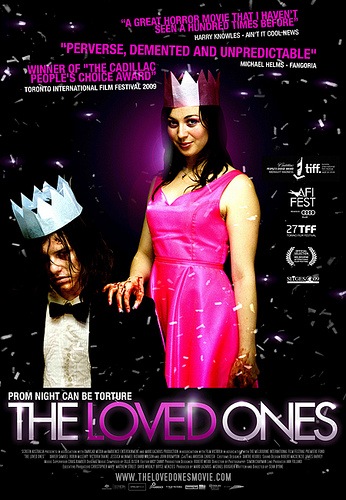
Happy Halloween! The Cabin in the Woods (2012) opens in a high-tech underground facility with senior technicians Gary (Richard Jenkins) and Steve (Bradley Whitford), discussing plans for a mysterious ritual, just like a failed one their colleagues in Stockholm have just held. Then, we meet a group of American college students about to leave for a weekend getaway in the forest: virginal Dana (Kristen Connolly); jock Curt (Chris Hemsworth), cheerleader Jules (Anna Hutchison), scholar Holden (Jesse Williams) and stoner Marty (Fran Kranz). When they arrive, they settle in but then after inspecting the cabin, several discoveries inside make feel very uneasy. And for good reason.
But here's the twist: it's all a hoax, at the hands of Gary, Steve and their crew. Now the kids must figure out how to escape this metafictional house of horrors, and why they were thrown into it.
The Cabin in the Woods comes with quite the pedigree: Drew Goddard, making his directorial debut, wrote Cloverfield, and serving as producer and co-writer was Joss Whedon. Their intention with this was to revitalise the horror genre which for them had suffered thanks to the advent of torture porn (and I must overall agree), and the finished product is the perfect satirical riposte: deliberately, consciously contrived and stereotypical and very funny, but nonetheless thoroughly imaginative, gory and relevant to our hyper-technological, media-controlled 21st century. The production design feels perfectly corporate and austere in the facility scenes, atmospheric and subconsciously inhabited in the cabin, and fully realised throughout, and there are flawless visual effects to go with this. Goddard also gets very natural performances out of his whole cast, particularly Fran Kranz who provides plenty of laughs before nicely exposing Marty's more serious side.
But I must say what most tickles my fancy about this movie is what I consider an anti-reality TV allegory in the whole crisis situation. Now, you don't have to share that sentiment or interpretation, but for me reality TV in general (and many of the slasher/torture porn films that inspired this) just never seems to even acknowledge how phony it is. But this, even in its parodic nature, is very much authentic, and as art in general should be, it is open to numerous different interpretations.If you have the stomach for it, The Cabin in the Woods is well worth a stay at.
But I must say what most tickles my fancy about this movie is what I consider an anti-reality TV allegory in the whole crisis situation. Now, you don't have to share that sentiment or interpretation, but for me reality TV in general (and many of the slasher/torture porn films that inspired this) just never seems to even acknowledge how phony it is. But this, even in its parodic nature, is very much authentic, and as art in general should be, it is open to numerous different interpretations.If you have the stomach for it, The Cabin in the Woods is well worth a stay at.

